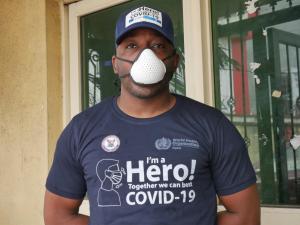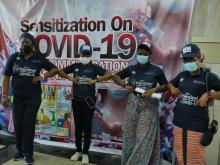Working with COVID-19 survivors to battle the pandemic
Lagos, 24 February 2021 - For Ade Ogunsanya, a resident of Nigeria’s commercial capital Lagos, a lapse in following the recommended COVID-19 preventive measures proved costly. Fortunately, he is a survivor who lived to tell his story.
Being asthmatic, Ade knew he had to be extra careful and adhere to necessary precautions such as properly wearing his mask in public places, sanitizing his hands regularly and maintaining social distancing. For a while he was too cautious that his friends made fun of him.
But he admits that whenever he hung out with his friends, he would throw caution to the wind, removing his mask to chat. In October 2020 he started to feel tired and experienced severe symptoms that appeared to be associated with the life-threatening disease, malaria.
“It was after I went to the hospital and got tested that I realized that I had caught the COVID-19 virus and that I had spread it to a loved one. I had to stay home for over a month, testing and re-testing several times before being confirmed free of the coronavirus,” Ade said.
Ade was among 48 COVID-19 survivors who were celebrated recently by the Lagos State Ministry of Health, with support from World Health Organization (WHO). The survivors recently gathered to give testimonies and learn how to become ambassadors advocating on living through COVID-19. The survivors are among 48 000 recovered patients in the state’s COVID-19 hotspots in Eti Osa and Alimosho Local Government Areas (LGA).
“Covid is real,” Ade declared when he spoke at the event. “I’ve lost loved ones, families and colleagues, so I count myself as one of the lucky ones.”
Dubbed the COVID-19 Heroes and Heroines campaign, the gatherings, where physical distancing was observed, helped survivors bond and share their experiences, including the mental and physical effort it took them to overcome the illness.
The Heroes and Heroines campaign is part of Lagos State’s drive to ramp up sensitization on COVID-19 for its 21 million population amid a second wave of the pandemic.
While some complied with distancing and masking guidelines at the beginning of the pandemic, there is less adherence to preventive measures. Nigeria is now seeing a sharp rise in COVID-19 cases.
Raising awareness of COVID-19 prevention is particularly important in Lagos, Nigeria’s biggest city and commercial capital. Lagos is the epicenter of the country’s outbreak, with more than 50 000 cases recorded by mid-February 2021.
To reduce the burden on frontline health workers at isolation centers, the state introduced home-based care in June 2020 as an alternative. Yet, with the rate of spread, attitude change will prove useful in helping people stay safe and reducing the burden on health facilities, experts say.
There is large scale disbelief at the existence of COVID-19 so the testimony of survivors goes a long way towards addressing this and influencing behaviours,” says Dr Tolulope Folarin, a WHO risk communications expert. “When those who have survived Covid-19 share some of the realities of living with it, that goes a long way in influencing those around them to be cautious.”
Lagos state and WHO are mobilizing survivors to reach out to communities and reinforce observance of preventive measures. Survivors are also urged to be ambassadors of hope to those battling the virus.
“Some people stopped coming to me, but I was never afraid of discussing what happened to me,” said Nancy Smith, a 73-year-old survivor living in Alimosho. She suffered severe lung distress for up to a month. “I like to talk about it so that people understand what it is like to contract COVID-19. Some people will shun you because you have COVID-19. God saved my life so I will be able to testify that it is not a death sentence.”
Speaking on ways survivors can spread the word about COVID-19 prevention, WHO Risk Communications Officer Dr Akinola Adeola said, “We’ve heard many people asking ‘Do you know anyone that has it?’ So we are saying speak about your experiences. Spreading the news on what it feels like to deal with COVID-19 will help dispel myths and rumors about the disease.” he added.
COVID-19 response lead for Alimosho LGA, Dr Odufuwa Kayode Adekunle, said Lagos State and WHO continue to ensure COVID-19 patients and their contacts are monitored.
Warning on leaving people unaware of Covid19 Dr Rosemary Onyibe, WHO South-West Zonal Coordinator warned that this could be devastating to the country. She said, “Let us save our people from being sick, let us save our economy from being shut down and help the government save on spending.”
For Ade, the shining light is that he survived because the state’s health officers never stopped calling till he was completely clear of the disease. Thanks to the efforts of the government of Nigeria and WHO.
Technical Contacts:
Dr Onyibe Rosemary Ifeoma; Email: onyiber [at] who.int (onyiber[at]who[dot]int); Tel: +234 805 6647 108
Der Yenyi Samuel Errie; Email: yenyis [at] who.int (yenyis[at]who[dot]int); Tel: +234 705 330 3292




